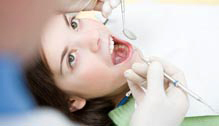 Following a proper and nutritious diet not only helps keep your body healthy, but your mouth as well. Nutrition plays an important role in the health and cleanliness of your teeth, gums and mouth.
Following a proper and nutritious diet not only helps keep your body healthy, but your mouth as well. Nutrition plays an important role in the health and cleanliness of your teeth, gums and mouth.Limit Soda, Coffee and Alcohol
Although these beverages contain a high level of phosphorous, which is a necessary mineral for a healthy mouth, too much phosphorous can deplete the body's level of calcium. This causes dental hygiene problems such as tooth decay and gum disease. Beverages containing additives such as corn syrup and food dye can make pearly white teeth appear dull and discolored. Therefore, it is best to choose beverages like milk, which helps strengthen teeth and build stronger enamel, giving you a healthy, beautiful smile.
Drink Tap Water When Possible
If bottled water is your main source of drinking water, you could be missing the decay-preventive benefits of fluoride.
Monitor Your Low-Carb Lifestyle
Despite their popularity, low-carb diets can cause bad breath. A balanced, dental-healthy diet can help reduce tooth decay.
Increase Your Calcium Intake
After age 20, both men and women lose more bone mass than they form so it is important to restore lost calcium with a daily supplement and by eating fruits and vegetables high in calcium, such as dark leafy greens. These foods will also help to lower the acid buildup in the saliva that can lead to breakdown of tooth enamel.
Take a Daily Dose of Vitamins C and D
These vitamins help support the absorption of healthy mouth minerals such as calcium and phosphorous, which support the bone and gum tissue, keeping it healthy. This is an easy way to maintain dental hygiene and fight gum disease.
Put Out the Cigarette
Smoking cigarettes is one of the greatest contributors to the aging mouth. According to the Center for Disease Control, more than 22 million women in the United States smoke cigarettes. In addition to staining teeth, smoking interrupts calcium absorption in the body and can also cause potentially life-threatening diseases such as oral cancer. So stop smoking and enjoy the health benefits as well as a healthy, beautiful smile.
The above article is from: OralB.com











